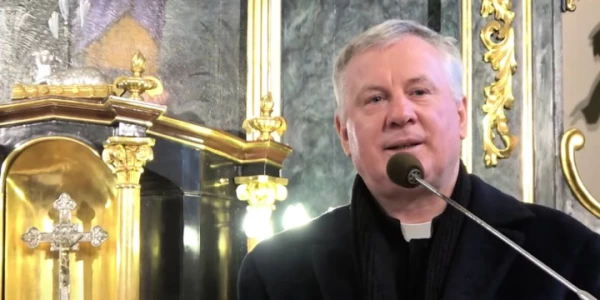Polish Catholic University Professor Who Endorsed Violently Antisemitic ‘Blood Libel’ Exonerated by Disciplinary Committee
24/03/2021 | Na stronie od 24/03/2021

Fr. Tadeusz Guz of the Catholic University of Lublin in Poland revived the antisemitic “blood libel” smear in a public lecture. Photo: YouTube.
From: The Algemeiner
A professor at Poland’s leading Catholic university has been spared from disciplinary action and exonerated for a lecture he delivered in 2018 in which he claimed that Polish Jews had engaged in ritual murder — one of the deadliest antisemitic falsehoods to have persisted over the centuries.
Fr. Tadeusz Guz, a professor of philosophy at the John Paul II Catholic University of Lublin (KUL), endorsed the “blood libel” during a May 26, 2018 public lecture in Warsaw, in which he falsely alleged that Jews in Poland had engaged in the slaughter of Christian children for ritual purposes.
“We know, dear people, that the facts of ritual murder cannot be erased from history,” Guz told his audience. “Why? Because we, the Polish state, in our archives, in the surviving documents, have had over the centuries — when Jews lived together with our Polish nation — we have legally valid sentences for ritual murders.”
After a complaint was filed by the Polish Council of Christians and Jews, both the Archdiocese of Lublin and the academic authorities at KUL distanced themselves from Guz, but notably refrained from taking further measures against him. “The lecture activities of Fr. Guza outside the university are undertaken and carried out by him on his own responsibility, and the theses he proclaimed are not the position of his superiors,” a joint statement from the two institutions proclaimed at the time.
At the same time, Guz’s case was transferred to another KUL academic, Prof. Annie Haładów, who deals with internal disciplinary issues. Almost two years after Guz’s original offense, Haładów decided to discontinue proceedings against him, apparently accepting his explanation that his remarks about ritual murder had been taken out of context. That decision was again appealed by the Polish Council of Christians and Jews.
Earlier this month, however, the KUL’s staff disciplinary committee vindicated Guz once more. In an astonishing statement that effectively endorsed Guz’s claim that there had been “legally valid” prosecutions of Polish Jews for ritual murder, the committee concluded that he had given “his lectures based on the source material, with professional care, and presented his own interpretation of historical facts.”
“Fr. Tadeusz Guz has not committed any act that would breach the duties of an academic teacher or the dignity of the academic teacher profession,” the committee statement continued. “In his lectures outside the campus, he did not offend anyone and did not insult anyone, and thus he did not dishonor his profession.”
The committee’s stalwart defense of Guz brought about an angry response from the NEVER AGAIN Association, Poland’s main NGO opposing racism and antisemitism.
“Contrary to the KUL committee’s claims, the whole lecture was antisemitic. He argued that Jews as a community have failed God by not converting to Christianity,” Rafał Pankowski, NEVER AGAIN’S director, told The Algemeiner on Wednesday.
Elsewhere in the same lecture, which remains available on YouTube, Guz claimed that the Talmud was based upon “lies” and that Karl Marx, the founder of Communism, had in fact been a “Jewish nationalist.”
Guz also accused Elie Wiesel — the late Holocaust survivor and winner of the Nobel Prize for Literature — of “defaming and offending God,” Pankowski noted.
According to Pankowski, Guz has been a regular guest on Radio Maryja — a major Catholic broadcaster that frequently transmits antisemitic content — and has delivered other antisemitic lectures in the past. In one such lecture, he accused powerful Jews of having financed Hitler’s regime and the Holocaust.
False accusations of ritual murder practiced by Jews were widely believed in Poland during the late medieval period. According to a comprehensive survey by the leading Polish historian Jacek Wijazcka, those beliefs survived well into the nineteenth and twentieth centuries. “The conviction that Jews committed ritual murders unfortunately still continues,” he wrote.
KUL is named in honor of its most famous academic — Karol Wojtyła, who taught philosophy at the university before he was elected Pope John Paul II in 1978. As the head of the Catholic Church, John Paul II emphasized dialogue with Jewish leaders and the importance of condemning antisemitism. In 2000, he acknowledged Catholic involvement in the persecution of the Jews for the first time, pointing to “the burden of guilt” that Christians bore “for the murder of the Jewish people.”